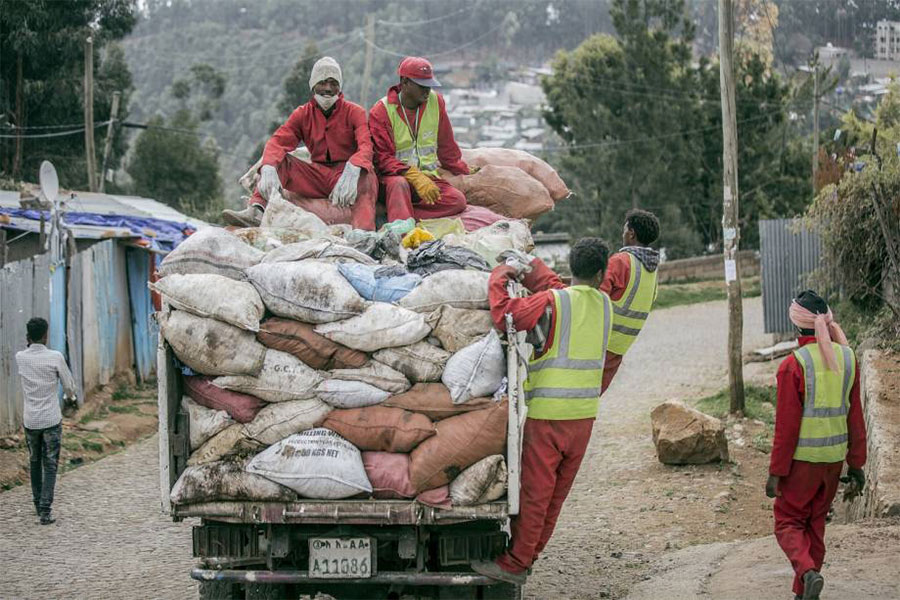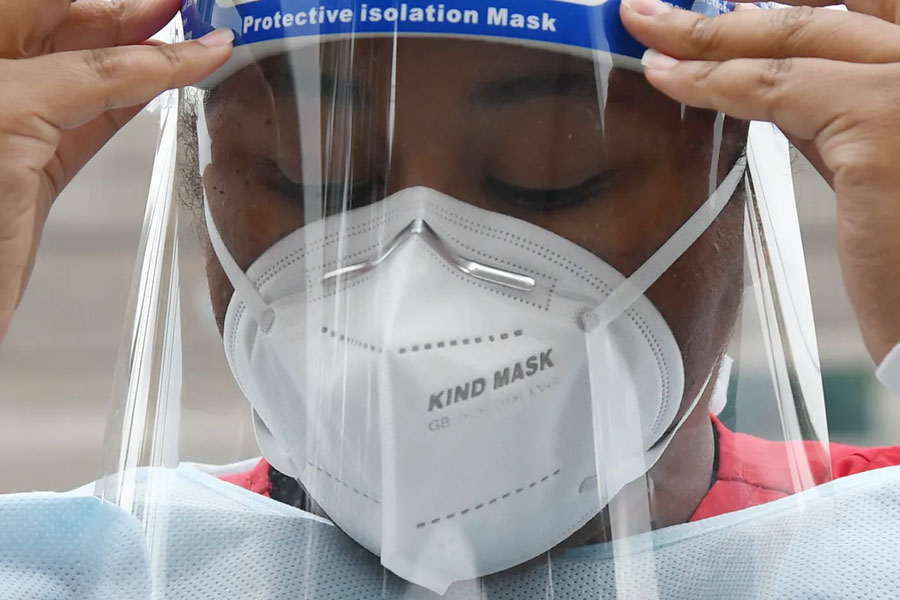
Radar | Jun 26,2021
Shemsu Hussien was transported in an ambulance from his hometown in Worabe, Silte Zone to Addis Abeba while he was fasting for Ramadan in June.
The 38-year-old farmer who lives with his wife in this small town located in the Southern Nations, Nationalities & People's Regional State, fell suddenly ill, and the local hospital decided to transfer him to Black Lion Specialised Hospital, one of the biggest referral hospitals in the capital, Addis Abeba, over 150Km away.
He was taken to the emergency section and spent 10 days in the Hospital. He was told to come back for a check-up a month later.
The farmer, born and raised in Worabe, does not have family in the city that he can stay overnight with when he comes for his check-up. He leaves his town before sunrise and is in Addis Abeba at the hospital before lunch.
"I finish the check-up during the day, and then I return home," he said.
Black Lion, where Shemsu is receiving treatment, is one of the oldest hospitals in the country. Patients from all across Ethiopia come to the Hospital, as they have done since 1972 when it first opened its doors. A few things are recommended when going to the Hospital's emergency room, where Shemsu was first taken. A face mask is one, though there are many patients that do not wear it.
A face shield and eye goggles are essential for the doctors in the triage room, the first stop for all patients coming in for their initial check-up. But a thick skin is mandatory for all. In this corner of the Hospital, the scene is brutal.
Doctors and nurses speed from one corner to the other with charts and double-layered surgical masks; severely ill patients use metal benches as makeshift beds draped in their gabis, a traditional woolen blanket; and orderlies wheel heavy-looking cylinders of oxygen from one section of the Hospital to the other.
Black Lion sees an average of 20,000 patients a day, according to Yirgu Gebrehiwot (MD), director of clinical services.
Or at least it used to, before the onset of the Novel Coronavirus (COVID-19) pandemic in the country. That number plunged significantly to as low as 4,000 by April, nearly five weeks after the first confirmed COVID-19 case in Ethiopia.
"Patients were scared of the virus and contracting it," said the director. "There was also the combined effect of transportation shortages from across regions."
This was due to restrictions placed on mobility as a means to contain the spread of the virus from Addis Abeba to other regions. The Hospital, which provides services found nowhere else in the country such as cancer treatment, had been classified as a non-COVID centre by the Ministry of Health in order to keep it as fully functional as possible.
It is also one of the institutions that administer COVID-19 tests, alongside Alert, another specialised hospital, and the Ethiopian Public Health Institute, where the majority of the over 9,000 daily tests take place. This was done in order to enable the Hospital to detect patients suspected of COVID-19 as soon as possible.
Black Lion has conducted close to 10,000 tests in the past 19 weeks. Tests were given only to suspected patients, attendants or healthcare providers who have had contact with a confirmed case.
"This includes patients that go into elective surgery as well," Yirgu said. "Though in principle, testing for COVID-19 isn't a prerequisite for providing medical care."
The tests are conducted, and results come back in 24 hours, making the decision to send a patient to a COVID-19 treatment centre or proceed with regular healthcare services faster, according to the director.
Patients and families sit in the waiting room at Saint Paul's Hospital, which was established in 1968 by Emperor Haile Selassie.
"We've had 124 cases confirmed here," he said. "There have also been 35 positive people from our staff."
The Hospital is employing multiple indicators to ensure that it is continuing to provide essential services to non-COVID-19 patients. This includes monitoring the number of outpatients and inpatients it has, as well as recording the number of births and deaths for a weekly report.
"It's essentially checking the pulse of the Hospital," said Yirgu.
The assessment is shared every week with the nation's COVID-19 Task Force, under the Essential Services Continuity Section.
"The response to the pandemic includes a very important element on how non-COVID-19 patients are receiving medical care," said Yakob Seman, director-general of medical services under the Minister of Health.
A good example is the case of Ebola, where more deaths were recorded in West African countries among mothers and young children due to the lack of health services at the time than from Ebola itself. Maternal death in Ethiopia accounts for over 12,000 deaths a year.
"There are a lot of people dying from preventable diseases in the country and the continuity of these services is extremely essential," he said.
The Section is divided into two with Program Continuity like vaccinations, family planning and others that fall under primary care headed by State Minister for Health, Dereje Duguma (MD), and Hospital Services Continuity by the Director-General. The latter is tasked with the continuity of essential services, and the provision of regular healthcare for patients across the country.
Black Lion is one of many health institutions that reports its findings to the team in accordance with the National Essential Services Continuity guideline, crafted by the Health Ministry.
The nationwide assessment takes place across 12 hospitals in the city, 24 teaching hospitals such as those at Bahir Dar and Meqelle universities, and over 300 hospitals across the country's nine regions.
"It encompasses 27 services including care for diabetes, blood pressure, surgery and others," he said. "It was meant to oversee and follow up on how non-COVID patients were being treated."
The notice on the procedure distributed and posted across hospitals regarding this, however, had an unexpected effect. Patients saw this as a warning that coming to the hospitals would be risky, according to Yakob.
"We put up the notice so hospitals could start differentiating patients with chronic illnesses," he said. "We wanted to start appointment spacing."
This was one mechanism it employed to minimise contact at health centres. Through this, patients that were deemed vulnerable would also be protected.
Within the first three weeks, patients coming to health institutions across the country had declined by about one-third of the original numbers, according to Yakob.
"But the work we've done after has been encouraging," said the Director-General. "Surgical services are less encouraging, however, because they require COVID-19 tests, making them more cumbersome to implement."
Telehealth, following up on patients through phone calls, has been another method.
That is how Shemsu's doctor communicates with him these days.
"He calls to ask if I have taken the medications," said Shemsu, who was initially shocked to receive the call. "I thought there was something wrong."
His reaction is shared by many under this programme, according to the Hospital's clinical head.
"This was new to them," he said. "The programme itself, however, is about seven years old."
Black Lion Hospital was using telehealth services in radiology and psychology over the past years to exchange information between doctors from different centres, according to Yirgu.
The Hospital now has 22 clinics under its wing providing these services following the Telehealth guideline of the Health Ministry. This is yet another practice to ensure the continuity of non-COVID-19 healthcare services at local health centres.
However, others haven't been as lucky as Shemsu.
Berta Yimechal, a 75-year-old man receiving care at Black Lion with multiple underlying issues, had been informed that he must start taking care of himself at home after the onset of COVID-19.
"He had diabetes as well as blood pressure, kidney and heart problems," said his son, Fasil.
Berta had been receiving care at Black Lion for over two years. After the Hospital informed the family that they should no longer come, they tried to get him treated at the local clinic in the neighbourhood, but that put a financial strain on the family.
His son says that the Hospital did this since his father was considered high-risk and coming to the Hospital would do more harm. Consequently, his father's appointment was moved to four months down the road. Berta, however, never made it back to his appointment. He passed away at their home, nearly two weeks ago.
Hospitals transformed into COVID-19 centres are now moving patients to local health centres along with the caregivers, according to Yakob.
"Eka Kotebe General Hospital, once transformed into a COVID-19 centre, stopped about half of its services," he said.
In a mitigating move, the Hospital's mental health ward has been moved to a building nearby along with the health professionals and patients. Similarly, St. Peter’s Specialised Hospital, which had been modified into a COVID-19 centre, moved its services to three nearby health centres in Janmeda, Shiromeda and Entoto Fana.
The Health Ministry is also employing indirect way of understanding the impact of COVID-19 on the overall healthcare system through following up on the deaths nationwide. But assessing impact is not an easy task as data, especially with regard to registering vital events, births and deaths, is not well-organised in the country.
The Addis Abeba Mortality Surveillance Programme, functional since 2001, has been doing exactly that following the HIV/AIDS global epidemic.
"Initially, it was set up to assess the impact of the HIV/AIDS virus," said Bilal Shikur (MD), who is leading the Programme. "It was also a way to see if the medication for the virus was helping."
Conducted at over 73 cemetery sites in the city, the Programme has been working on assessing the impact of COVID-19 since March: registering the number of deaths along with causes.
The Programme uses verbal autopsy from family members to determine the cause of death and implements a rapid assessment tool designed by the World Health Organisation (WHO) to determine the probability of the death being caused by COVID-19.
"This is alongside registering the number of deaths in the city," he said.
Still, interpreting such data takes time.
The number of deaths in the city, despite the growing population numbers, is decreasing. This is due to vaccinations and other healthcare interventions by the Health Institute, according to Bilal.
"What we have to look at now is whether the number of deaths is decreasing at the same rate," he said. "If not, it could mean a rising death toll despite lower numbers compared to the previous year."
Assessments done until the end of May show no significant changes in death rates in the city. The rate of decrease has also been consistent, according to the study.
"The results of June and July, which would be more telling, are still being analysed," he said.
A country with an existing gap in its healthcare system like Ethiopia is bound to be more burdened by this pandemic, according to Abiy Seifu, a member of the Emergency Operation Centre under Addis Abeba University's College of Health Sciences.
But acknowledging that and being able to work with what we have is the first step, he advises.
The global nature of the pandemic had brought on it more limelight than any other issue. This brings along with it another pandemic of fear, according to Abiy.
"We must not get carried away," he said, "but rather focus on making decisions based on facts and science."
It will undoubtedly put pressure on the healthcare system, but the response of the country to the pandemic needs to be based locally, taking into consideration the available resources at hand, according to him.
"Basing the response for the country following a global trend will lead to misuse of resources," Abiy said.
PUBLISHED ON
Aug 08,2020 [ VOL
21 , NO
1058]

Radar | Jun 26,2021

Radar | Oct 24,2020

View From Arada | Oct 10,2020

Sunday with Eden | Aug 08,2020

Radar | Apr 17,2021

Fortune News | Apr 03,2021

View From Arada | Oct 20,2024

Covid-19 | Aug 08,2020

Radar | Oct 23,2021

Commentaries | Sep 27,2020

Dec 22 , 2024 . By TIZITA SHEWAFERAW
Charged with transforming colossal state-owned enterprises into modern and competitiv...

Aug 18 , 2024 . By AKSAH ITALO
Although predictable Yonas Zerihun's job in the ride-hailing service is not immune to...

Jul 28 , 2024 . By TIZITA SHEWAFERAW
Unhabitual, perhaps too many, Samuel Gebreyohannes, 38, used to occasionally enjoy a couple of beers at breakfast. However, he recently swit...

Jul 13 , 2024 . By AKSAH ITALO
Investors who rely on tractors, trucks, and field vehicles for commuting, transporting commodities, and f...

Nov 1 , 2025
The National Bank of Ethiopia (NBE) issued a statement two weeks ago that appeared to...

Oct 25 , 2025
The regulatory machinery is on overdrive. In only two years, no fewer than 35 new pro...

Oct 18 , 2025
The political establishment, notably the ruling party and its top brass, has become p...

Oct 11 , 2025
Ladislas Farago, a roving Associated Press (AP) correspondent, arrived in Ethiopia in...